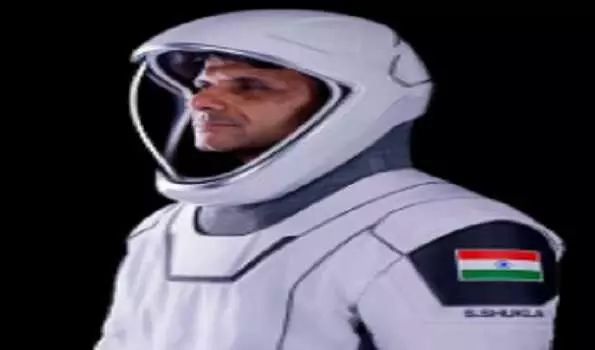Group Captain Shubhanshu Shukla Enters ISS, Becomes Second Indian in Space

Group Captain Shubhanshu Shukla’s entry into the International Space Station (ISS) marks more than just a historic return of an Indian to space, it lays the groundwork for India's own crewed mission under the Gaganyaan programme, said veteran space expert and former scientist Dr RC Kapoor.
"This isn’t just a milestone, it’s a dress rehearsal for Gaganyaan," Dr Kapoor told UNI, moments after SpaceX’s Dragon capsule, carrying the Axiom-4 crew including Shukla, docked successfully with the ISS’s Harmony module today. "We’ve just witnessed history, but more importantly, we’re preparing for the future."
Describing the mission as a technical and operational bridge between international collaboration and India’s indigenous ambitions, Kapoor explained how the elaborate post-docking protocols—like pressure equalisation and seal integrity checks—mirror the challenges ISRO must master before it sends its own astronauts into orbit. “In space, there are no second chances. Shukla is not just learning; he’s testing systems, habits, and readiness that will directly benefit Gaganyaan,” he said.
Shukla, the second Indian to reach space after Rakesh Sharma in 1984, will spend 14 days aboard the ISS conducting seven critical experiments in agriculture, microbiology, and human physiology and psychology—key areas that will guide Indian scientists as they design life support and research modules for Gaganyaan.
“These are not random experiments,” Kapoor noted. “They’re carefully chosen to simulate the kind of research Gaganyaan will carry out. From muscle degradation in microgravity to biological responses in space, everything Shukla records will have practical value for India’s mission design.”
He stressed the importance of physical exercise in orbit, saying astronauts must use treadmills and resistance machines to counter muscle and bone loss in zero gravity. “Neglecting this means returning astronauts could collapse on Earth. This is real, and ISRO needs to build in these routines,” he added.
What sets this mission apart, Kapoor emphasised, is Shukla’s cross-system exposure. Having trained under Russian, NASA, SpaceX, and ISRO modules, the IAF officer brings a unique comparative understanding. “Shukla will return not just with data, but with a lived experience of global systems—vital for customising India’s approach,” Kapoor said.
He called the mission a “strategic testbed” for India’s future human spaceflight plans. “We now know what to expect—from the biology of the body to the behaviour of the capsule. Shukla’s journey is more than symbolic; it is shaping the Gaganyaan blueprint.”
As India eyes its own orbital outpost in the coming decades, Kapoor believes Shukla’s mission will serve as an early foundation. “We’re not starting from zero anymore. With missions like this, India is finally building a legacy in human spaceflight.”
